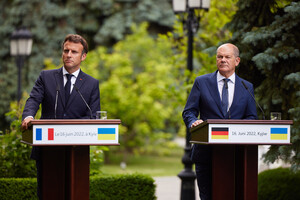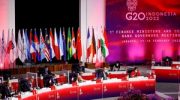The continent's most powerful economy and its most powerful army were not sufficiently involved in the war even after the announcement of mobilization in Russia.

Decision of Russian President Vladimir Putin in part mobilizing reservistsis a significant escalation of his war against Ukraine. In the coming weeks and months, the Kremlin could bring up to 300,000 additional troops to the war – just as Ukraine has achieved significant success on the battlefield. Increasing Western aid is now vital for Kyiv to expand its gains and build up its defensive positions before additional Russian forces enter the fray. But not all Western states have made efforts in this regard – especially Paris and Berlin. John R. Deni, a professor and researcher at the Institute for Strategic Studies of the US Army War College, writes about this in his article for Politico.
The Franco-German engine has been driving the European Union for over 70 years. Today, however, that engine has stalled in the face of the biggest challenge to European security since the end of World War II. The continent's most powerful economy and its most powerful army cannot handle this moment. And, unfortunately, the chances of either of them changing course are slim.
Also read: FT: Ukraine will have to increase its army next year due to mobilization in Russia
Immediately after the Russian invasion of Ukraine, the leaders of both France and Germany recognized the scale of the crisis. Emmanuel Macron highlighted the damage Russia has done to European peace and stability, saying the West “will not be weak” in response in the military, economic and energy spheres. Meanwhile, German Chancellor Olaf Scholz said that Putin had destroyed the European security architecture, and that the Russian invasion was a turning point and now was the time to support Ukraine “to the best of our ability”.
However, since those early days of action by France and Germany did not match their own rhetoric. Germany delayed sending military equipment for months, which other allies supplied to Ukraine. After promising to deliver multiple rocket launchers, self-propelled guns and air defense systems, the slow pace of delivery has cast doubt on Berlin's commitment. And Germany's apparent reluctance to send heavy armored vehicles has drawn criticism from Ukrainian leaders.
Meanwhile, France is deliberately cutting aid in hopes of playing the role of a neutral arbiter after the war's heated phase is over. Macron did irreparable damage to his claim to leadership in Europe when urged Ukraine to avoid humiliating Putin. Although the country has provided Ukraine with offensive weapons, their number is even less than from Germany.
Read also: Russia's war against Ukraine is helping Germany to “wake up” – The Economist
It is clear that both of these the leading European countries failed to succeed, but for two very different reasons.
For more than half a century, Germany has pursued an approach to Russia based on cooperative change through trade. Now, finally realizing Moscow's zero-sum approach and its corresponding disdain for cooperation with the West, Berlin is trying to reverse its long-standing strategy. But change is never easy, especially in Germany, and it's two steps forward and one step back.
And for France, the dynamic in question is not change, but the status quo. Residual illusions of French grandeur underlie Macron's attempts to find an elusive middle ground between the West and Russia. In Europe, France's leading role in the struggle for European “strategic autonomy” in recent years has been seen as a hidden attempt to advance the country's own interests. However, by trying to position France as a practical, neutral arbiter between Ukraine and Russia, Macron undermined Paris' reputation as a defender of Western values and interests.
Also read: Play a role in Ukraine's success: Bundestag called for more weapons immediately
As France's pursuit of greatness continues and Germany's 50-year-old foreign policy won't change overnight, both of these powers are unlikely to play a leading role in helping Ukraine in the short term. This is especially problematic now, when Kyiv is looking to maintain momentum after major success on the battlefield. Despite the fact that the news from the Kharkiv region in recent days has been extremely positive for Kyiv, there are still many reasons to believe that Russia is far from exiting the conflict.
First, Ukraine's progress in the south remains slow and difficult. In addition, Moscow retains the ability to deliver high-precision long-range strikes against Ukrainian infrastructure. But the most important thing is that Russia still has both qualitative and quantitative military advantages over Ukraine in both manpower and equipment.
Read also: Macron's diplomacy in Ukraine is “disastrous” – the former head of NATO
For all these reasons, especially given Putin's partial mobilization, the war is likely to continue for months, if not years, to come. Ukraine is unlikely to remain in the war without significant long-term help from the West, including high-precision weapons, which they have already used with success. But they will need more.
Related video
The United States, Great Britain, Poland and other allies are providing training, weapons, expertise and intelligence. In response to Putin's mobilization, France and Germany also have the opportunity to do so, but whether and when they will realize their potential remains to be seen.
See special topic: < strong>New Zealand has strengthened sanctions against Russia The country is ready to provide further military assistance to Ukraine if Kyiv's needs match its reserves. Defense Express assessed a new challenge for the Armed Forces — Iranian drones They explained that the American processors in these UAVs are intended for household appliances, so they are quite common. Kamikaze drones attacked the Mykolaiv region again: the Armed Forces of Ukraine destroyed them We are talking about the Shahed-136 UAV. The Kraken special unit told how they captured 15 Russian officers The stories of these prisoners of war only confirm that the Russian Federation has big problems with the staffing of the army. The occupied territories of Ukraine will be turned into the Crimean district, which will be headed by Rogozin – rosZMI The former head of Roscosmos has been waiting for his “position” since July.


